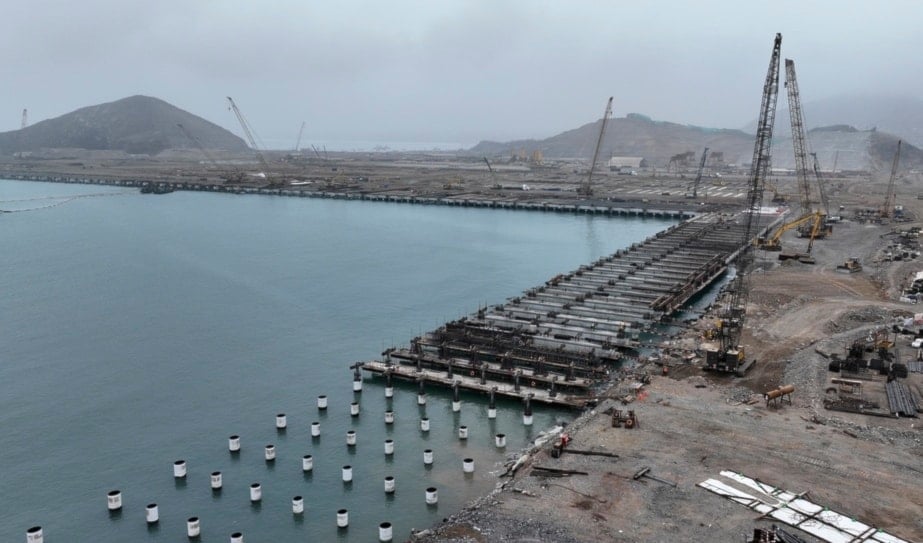China, Brazil deepen trade ties with talks on railway to Peru megaport
A Chinese delegation visits Brazil to discuss a railway project connecting to Peru’s Chancay port, part of broader China-Brazil trade relations and South America’s infrastructure expansion.
-

Cranes work in the construction of the Chancay Multipurpose Port Terminal, built by a Chinese company in Chancay, Peru, Tuesday, Aug. 22, 2023 (AP)
A Chinese delegation has concluded a visit to Brazil aimed at strengthening China-Brazil trade relations, with a key focus on a proposed railway linking Brazil to Peru’s Chancay mega port on the Pacific coast.
The initiative is part of China’s broader efforts to enhance connectivity across South America through strategic infrastructure investments.
The week-long visit saw officials from China’s Ministry of Transport and the state-owned railway group touring major sites across Brazil. The trip follows agreements signed during Chinese President Xi Jinping’s state visit to Brazil last November, hosted by President Luiz Inácio Lula da Silva.
Among those agreements was a commitment to improving Brazil’s access to the Pacific Ocean, designated as one of the four strategic pillars of bilateral cooperation.
“This marks the beginning of a technical relationship for in-depth studies, particularly in the railway sector,” said João Villaverde, Secretary of Institutional Coordination at Brazil’s Ministry of Planning. “This aligns with our shared strategic pillars.”
China Eyes Strategic Transport Projects in South America
The delegation’s visit included inspections of various infrastructure projects identified as critical to South America’s future trade routes.
According to Brazil’s Executive Office of the Presidency, the delegation expressed strong interest in investment opportunities tied to the proposed Bi-Oceanic Corridor, a transportation route designed to connect the Atlantic coast of Brazil to the Pacific coast of Peru.
Officials say the corridor could allow for more direct exports from Brazil and neighboring countries to Asia by bypassing traditional Atlantic shipping lanes, reducing both transit times and logistical costs. The route is expected to particularly benefit exports of soybeans, beef, and grains.
Bi-Oceanic Corridor: A Game Changer for Brazil’s Exports
The Bi-Oceanic Corridor represents a major step in integrating Brazil’s economy with Asian markets. By facilitating direct overland access to the Pacific Ocean, the corridor would improve the efficiency of agricultural trade, making Brazil a more competitive exporter in global markets.
The concept closely aligns with China's Belt and Road Initiative, which has prioritized infrastructure development to expand trade routes across continents. For Brazil, the railway would mark a strategic breakthrough in reducing reliance on congested Atlantic ports and opening up new commercial possibilities.
At the heart of the corridor is Peru’s Chancay mega port, a Chinese-backed project set to become a key maritime gateway on the Pacific.
Once operational, the port will be a central node for South American exports heading to Asia, reinforcing China's growing role in South America's infrastructure development.
China-Brazil agricultural trade to speed up amid retaliatory tariffs
The tariffs imposed by the United States on China in March had already accelerated its shift toward Brazil, which is now on track for a record-breaking second-quarter surge in soybean exports to China.
"Brazil will be by far the main beneficiary, the biggest supplier that can replace US soybeans to China. But others could benefit too, including Argentina and Paraguay. On wheat, Australia and Argentina should benefit," said Carlos Mera, head of Agricultural Market Research at Rabobank.
Sol Arcidiacono of HedgePoint Global Markets said that South American soybean prices will likely remain strong: “The basis for South American soybeans will get stronger for the full year, despite seasonality and record crops as the trade war escalates.”
She added that “current geopolitics will likely drive an increase in acreage for soybeans, mainly in Brazil, where expansion had been slowing lately.”
Read more: Lula promises retaliation against US steel tariffs

 4 Min Read
4 Min Read









